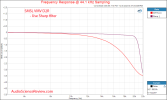-
Welcome to ASR. There are many reviews of audio hardware and expert members to help answer your questions. Click here to have your audio equipment measured for free!
You are using an out of date browser. It may not display this or other websites correctly.
You should upgrade or use an alternative browser.
You should upgrade or use an alternative browser.
- Thread Starter
- #3
How? They have to decide on a form of roll off and a filter length and accordingly on a time frequency behaviorBecause DAC filters are designed to be audibly transparent. They don't alter the song in a way that matters.
Sokel
Master Contributor
- Joined
- Sep 8, 2021
- Messages
- 9,543
- Likes
- 10,246
I can't hear that high, and probably never could.
If the recordings are produced properly, all content is at frequencies below half the sample rate. DAC filters aim to eliminate only content with frequencies at or above half the sample rate that is generated from the original samples if not filtered called images. Most filters with fast roll off extend to beyond 20 kHz even at 44.1 kHz before attenuating while slow roll off filters attenuate earlier. Fast filters produce more ringing with content above half the sample rate and have higher latency.
If you find DAC filters too restrictive, software upsampling can get quite close to an ideal filter. The DAC is then operating its filter at a higher sample rate, where it has little effect in the passband of the signal.How? They have to decide on a form of roll off and a filter length and accordingly on a time frequency behavior
DVDdoug
Major Contributor
- Joined
- May 27, 2021
- Messages
- 4,448
- Likes
- 6,125
Our hearing just isn't "that good"How? They have to decide on a form of roll off and a filter length and accordingly on a time frequency behavior
The ONLY time I've heard a difference or defect from a "DAC" it was a noisy soundcard that made noises when the hard drive was accessed.
And once I was doing some experiments with a different soundcard and oscilloscope and I was SHOCKED to see that particular soundcard was not filtered at all!!! I could see a "nicely" stair-stepped waveform. I had never noticed anything wrong. After I thought about it, I realized that the harmonics are above the audible range, the amplifier built-into the speakers might have had some accidental or incidental ultrasonic filtering, and the tweeter doesn't that high either.
I don't own a stand-alone DAC. There's a DAC built into my AVR, phone, soundcards, etc.
Almost all DACs upsample internally to reduce the effort of the analog reconstruction filter. No need to do this beforehand.If you find DAC filters too restrictive, software upsampling can get quite close to an ideal filter. The DAC is then operating its filter at a higher sample rate, where it has little effect in the passband of the signal.
As an extreme example, a 1 million tap software OS filter can be much closer to the ideal filter than any DACs OS filter. Whether that is significant is another question.Almost all DACs upsample internally to reduce the effort of the analog reconstruction filter. No need to do this beforehand.
Significant would be the delay of such an FIR filter, more than 22 s at 44.1 kHz samplerate ...As an extreme example, a 1 million tap software OS filter can be much closer to the ideal filter than any DACs OS filter. Whether that is significant is another question.
Half that since it is symmetrical: (1M/2)/fs. Also you would not sample to 44.1 kHz but to something higher. For 705.6 kHz, i.e. 16x44.1 kHz delay is only 500000/705600 = 0.7086 s.Significant would be the delay of such an FIR filter, more than 22 s at 44.1 kHz samplerate ...
kemmler3D
Master Contributor
The same way it is possible to appreciate a painting without the benefit of UV light.How is it possible to judge songs objectively if the native band-limiting characteristics of a song are ultimately overwritten by the DAC filter?
If you are concerned about losing useful content above 20Khz, don't worry. The recording is already band-limited when it's published, and most musicians and studio crew can't hear frequencies that high in the first place, so whatever is up there (if anything) will largely be accidental.
Similar threads
- Replies
- 1
- Views
- 489
- Replies
- 30
- Views
- 3K
